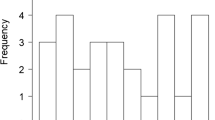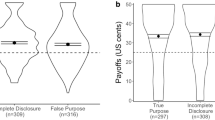Abstract
In the Registered Modeling Report format, authors specify the experimental design, models, and inference mechanism before they have seen the data and reviewers evaluate the level of detail and quality of the proposed plan. While useful, the Registered Modeling Report is limited in its ability to incentivize strong tests. I propose an extension to the Registered Modeling Report format, the Really Risky Registered Modeling Report, in which reviewers are required to evaluate whether a bad fit between the model predictions and the empirical data is plausible. The two crucial additions are that authors include prior predictions in the protocol and that reviewers set a data prior in Stage 1. Only protocols containing predictions that are not almost guaranteed to be confirmed when brought in contact with empirical data are eligible for in principle acceptance. Adopting the Really Risky Registered Modeling Report will lead to strong model tests and solid evidence.
Similar content being viewed by others
Notes
It is not clear what kind of deviations are tolerable for a guaranteed acceptance. This is currently an unresolved but important issue, not in the least because modeling is an inherently creative and iterative endeavor, making deviations from the protocol highly expected.
Contrary to what the name might suggest, a data prior is needed to assess riskiness of predictions even if one is working outside of the Bayesian framework.
References
Box, G.E. (1980). Sampling and Bayes’ inference in scientific modelling and robustness. Journal of the Royal Statistical Society: Series A (General), 143(4), 383–404.
Chambers, C.D. (2013). Registered reports: A new publishing initiative at Cortex. Cortex, 49(3), 609–610.
Lakatos, I. (1978). The methodology of scientific research programmes. Cambridge: Cambridge University Press.
Lee, M.D. (2018). Bayesian methods in cognitive modeling. The Stevens’ handbook of experimental psychology and cognitive neuroscience, 5, 37–84.
Lee, M. D., Criss, A. H., Devezer, B., Donkin, C., Etz, A., Leite, F.P., Vandekerckhove, J. (2019). Robust modeling in cognitive science. Computational Brain & Behavior. https://doi.org/10.31234/osf.io/dmfhk.
Lee, M.D., & Vanpaemel, W. (2018). Determining informative priors for cognitive models. Psychonomic Bulletin and Review, 25(1), 114–127.
Mayo, D.G. (2019). Statistical inference as severe testing. Cambridge: Cambridge University Press.
Meehl, P.E. (1990). Appraising and amending theories: The strategy of Lakatosian defense and two principles that warrant it. Psychological Inquiry, 1(2), 108–141.
Platt, J.R. (1964). Strong inference. Science, 146, 347–353.
Popper, K.R. (1959). The logic of scientific discovery. London: Hutchinson.
Roberts, S., & Pashler, H. (2000). How persuasive is a good fit? A comment on theory testing. Psychological Review, 107, 358–367.
Roberts, S., & Pashler, H. (2002). Reply to Rodgers and Rowe (2002). Psychological Review, 109, 605–607.
Schad, D.J., Betancourt, M., Vasishth, S. (2019). Toward a principled Bayesian workflow in cognitive science. arXiv:1904.12765.
Vanpaemel, W. (2009). Measuring model complexity with the prior predictive. In Bengio, Y., Schuurmans, D., Lafferty, J., Williams, C.K.I., Culotta, A. (Eds.) Advances in neural information processing systems, (Vol. 2 pp. 1919–1927).
Vanpaemel, W. (2010). Prior sensitivity in theory testing: An apologia for the Bayes factor. Journal of Mathematical Psychology, 54, 491–498.
Vanpaemel, W. (in press). Strong theory testing using the prior predictive and the data prior. Psychological Review.
Vanpaemel, W., & Lee, M.D. (2012a). The Bayesian evaluation of categorization models: Comment on Wills and Pothos. Psychological Bulletin, 138(6), 1253–1258.
Vanpaemel, W., & Lee, M.D. (2012b). Using priors to formalize theory: Optimal attention and the generalized context model. Psychonomic Bulletin and Review, 19, 1047–1056.
Author information
Authors and Affiliations
Corresponding author
Additional information
Publisher’s Note
Springer Nature remains neutral with regard to jurisdictional claims in published maps and institutional affiliations.
I am grateful for the stimulating questions and observations of two anonymous reviewers.
Rights and permissions
About this article
Cite this article
Vanpaemel, W. The Really Risky Registered Modeling Report: Incentivizing Strong Tests and HONEST Modeling in Cognitive Science. Comput Brain Behav 2, 218–222 (2019). https://doi.org/10.1007/s42113-019-00056-9
Published:
Issue Date:
DOI: https://doi.org/10.1007/s42113-019-00056-9




